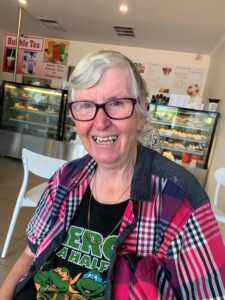“I miss my friends but I would never go back” – one woman’s experience of working in ADEs
Ahead of the Disability Royal Commission hearing on Australian Disability Enterprises, Georgie – a woman with disability in her 60s from Perth, Western Australia talked with Jamie Bannister about her long career.

Meet Georgie
Georgie is originally from Melbourne. She moved to Perth when she was 10.
Now in her 60s, Georgie works part time at Shelter WA, and does part time work for Developmental Disability WA (DDWA) as part of the Towards Inclusive Practice project.
In her spare time Georgie likes to catch up with friends for coffee, play on her iPad and barrack for the West Coast Eagles in AFL.
Georgie’s career
Georgie has had a long career, full of different roles. Her first job was in the 1970s, working for the Good Sammy charity in WA. “People were kind and friendly there.”
She then moved to working in a Good Sammy shop. The days were long, from 9-5 and 9-6 on weekends. “There was lots of standing up which I didn’t like as it made me very tired.”
One day in the 1980s Georgie saw a sign for Activ, a disability service provider in Perth. She put her name down and was invited to come in for an interview. She was quickly offered a place at Activ.
Her work included putting labels on beer bottles, and lollies in show bags. She worked five days a week, from 8.30am to 3.30pm.
Unfortunately, she does not have good memories of her time there. “I didn’t like it. Some of the staff you get on with, but others treated us badly. They would tell us to ‘sit down and do your job.’”
Georgie felt that the paid staff and the staff with disabilities were not treated the same. “They would have morning teas with nice food, but we couldn’t have any. We were not allowed or had to bring in our own.”
One time Georgie met up with her work friends for lunch on her day off. “I went to the bar and ordered a beer and the staff yelled ‘what are you doing Georgie?’ I said, ‘I’m having a beer, I’m allowed.’”
Georgie remembers the staff telling the ADE workers that they were not allowed to have the broken lollies they put in the showbags. “Then we would see them put them away in a drawer and eating them later.”
After getting her 5-year badge, Georgie decided to leave after 8 years. “They moved the place to another site. It was too far away. You had to pay for your own bus fare to get there so it wasn’t worth it.”
Later on Georgie worked for the City of Fremantle and Fremantle Hospital. “I promised myself I would never, ever go back to a sheltered workshop. I miss my friends, but I would never go back if you gave me $1000.”
Eventually Georgie found out about DDWA. She loves working there. “The people are like family here,” she says.
What needs to change about ADEs?
“Staff need training themselves on respect. The way staff treated people was not OK. We have the same rights they have”
What would you say to people who enjoy working at an ADE?
Georgie says that she has some friends who still work at Activ. One friend has been there for 38 years. “Some of the guys worry they won’t see their friends anymore [if they leave].”
“Some people like it, they think it’s great. But I get paid properly for my work [in the Towards Inclusive Practice project]. It helps me to budget and save for things.”
“Jobs are harder to get now because of COVID,” says Georgie. “There should be more help for people who want to get into open employment. Open employment is best. You get more money and real pay.”
What would you say to the Disability Royal Commission about ADEs?
“If I had a choice, I’d close them down. It’s unfair on the guys. I’d say you need to get every person out. Get them out of the workshops.”
Georgie can also see similarities with previous campaigns about segregation of people with disabilities. “It’s like the old institutions. People don’t have choices about where to live and work. I see some services where they spent lots and lots of money to make them all new again. Nah, close them down.”
